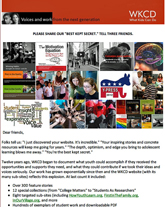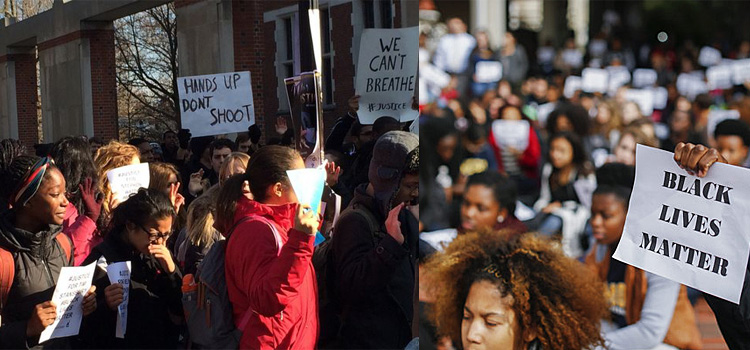OTHER WKCD WEBSITES SPECIAL COLLECTIONS Students as Allies in School POPULAR WKCD PUBLICATIONS (PDFS] A Guide to Creating Teen- Cultural Conversations through Creative Writing Documenting Immigration Stories First Ask, Then Listen: How Your Students Can Help You Teach Them Better Making Writing Essential to Profiles of Politically Active Youth Queer Youth Advice for Educators The Schools We Need: Creating Small High Schools That Work for Us
| Teaching About Ferguson, Eric Garner, and Beyond from WKCD| DECEMBER 15, 2014
Photo credits: (L) nj.com; (R): chicagotribune.com
WKCD couldn't agree more with high school teacher Joshua Block. In addition to the links included in his post, there's a growing collection of resources and discussion starters for helping students understand these urgent issues and take restorative action that we note below.
Teaching About Ferguson: Race and Racism in the United States | Teaching Tolerance, 12.9.14 The deaths of Michael Brown in Ferguson, Eric Garner in New York City and Tamir Rice in Cleveland—along with the grand jury decisions in the earlier two cases—have caused waves of nationwide protest and appeals for stronger protections against police brutality. These events have also caused educators to seek resources on how to address these subjects in the classroom. These Teaching Tolerance resources can help spur much-needed discussion around implicit bias and systemic racism, but they can also empower your students to enact the changes that will create a more just society. On Nov. 24, a St. Louis County grand jury announced that it had brought no criminal charges against Darren Wilson for the fatal shooting of Michael Brown. Thousands took to the streets in cities across the country—from Los Angeles to Atlanta to New York—to protest the decision. In an essay in the Sunday Review on Nov. 30, Michael Eric Dyson asked, “Where Do We Go After Ferguson?” He reflects on the fact that black and white people “rarely see race in the same way,” and notes: "The instrument through which one perceives race—one’s culture, one’s experiences, one’s fears and fantasies—alters in crucial ways what it measures." Here, the Times' Learning Network updates some of the resources in the Ferguson lesson plan for addressing this new chapter in race relations and policing. Useful Resources For Teaching About Eric Garner's Death | Larry Ferlazzo edublogs.org, 12//3/14 For the past two months, education blogger has offered resources that teachers teachers might find useful when discussing the Ferguson tragedy, racial profiling and racism, violence and policing. In this post who offeres resources for classroom discussions about Eric Garner's death and the decision to not indict the police officer who used an illegal choke hold on him—along with links to the Ferguson resources. Helping kids understand their rights when they’re stopped by the police | PBS NewsHour, 12.5.14 The recent decision of two grand juries not to indict officers in the deaths of Eric Garner or Michael Brown have been addressed in hundreds of classrooms throughout the country. Amber Joseph, a New York City middle school teacher, discusses how schools can help students channel their reactions into action. Challenging Stereotypes: Michael Brown and #IfTheyGunnedMeDown | Morningside Center, 8.25.14 Students explore the mainstream media's portrayal of Michael Brown, an unarmed teenager, by a police officer in Ferguson, MO, and the conversation it has touched off about racial stereotyping. After Eric Garner: One School’s Courageous Conversation | blog post on facinghistory.org, 12.10.14 "As I prepared to write this post, I had to confront the most difficult, yet most important, person that I would be in conversation with: myself. I am an African American male with a 21-year-old son. I have always prided myself on staying “above the fray” in conversations about race. I try to find a place of mutual understanding, to give others the benefit of the doubt, and to attempt to see an experience from the other’s perspective. As a Facing History and Ourselves staff member for the past 13 years, and its Associate Program Director for Urban Education for the past four, I regularly facilitate conversations of this nature with students, educators, parents, and community leaders around the world. . . ." Defying Ban, Students March to Brooklyn in Protest of Eric Garner Decision | New York Times, 12.9.14 The grand jury decision not to indict a police officer in the death of Eric Garner did not go unnoticed at East Side Community High School.The highlight was to be the “teach-out”— a march on Tuesday with school parents and administrators over the Brooklyn Bridge to the United States attorney’s office in Brooklyn, where they would deliver a petition asking for federal charges against the officer at the center of the Garner case. Commentaries by NYTimes columnist Charles Blow NY Times columnist Charles Blow has written a series of pieces, since Ferguson, that are consistently thoughtful and provocative—fuel for deep classroom discussions.
What Kids Can Do, Inc. | info@whatkidscando.org | www.whatkidscando.org
|



